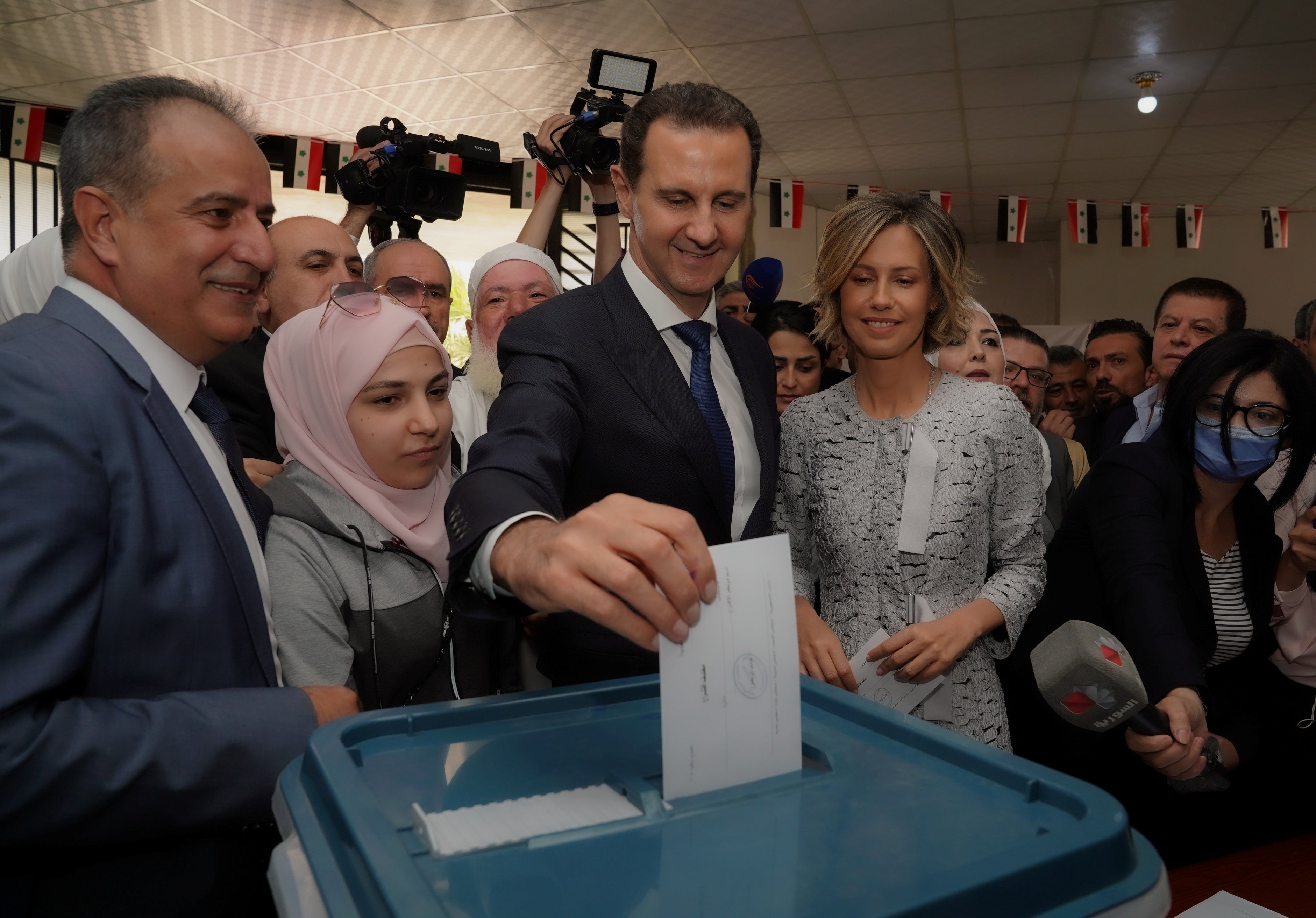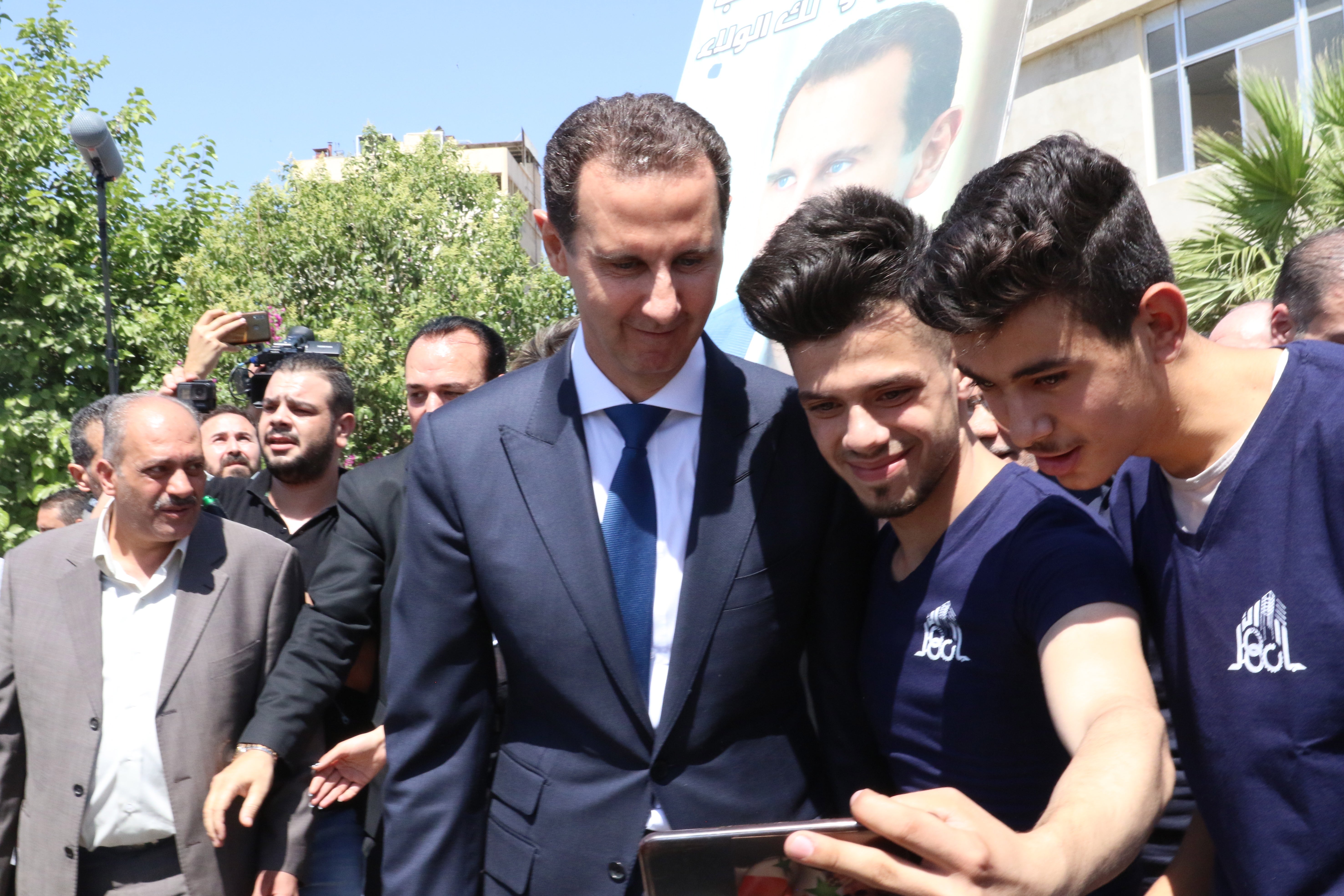Syria election: Bashar Assad votes in former rebel town Douma, site of chemical attack
‘Today we prove from Douma that the Syrian people are one’ he said as he cast his ballot.

Your support helps us to tell the story
From reproductive rights to climate change to Big Tech, The Independent is on the ground when the story is developing. Whether it's investigating the financials of Elon Musk's pro-Trump PAC or producing our latest documentary, 'The A Word', which shines a light on the American women fighting for reproductive rights, we know how important it is to parse out the facts from the messaging.
At such a critical moment in US history, we need reporters on the ground. Your donation allows us to keep sending journalists to speak to both sides of the story.
The Independent is trusted by Americans across the entire political spectrum. And unlike many other quality news outlets, we choose not to lock Americans out of our reporting and analysis with paywalls. We believe quality journalism should be available to everyone, paid for by those who can afford it.
Your support makes all the difference.Syria's President Bashar Assad voted on Wednesday in an election set to tighten his grip over a country mired in more than a decade-long conflict.
He cast his ballot in the former rebel stronghold of Douma, the site of a suspected chemical weapons attack in 2018, which, in retaliation, saw heavy military strikes by the US, UK and France.
After voting, Assad said: "Syria is not what they were trying to market, one city against the other and sect against the other or civil war. Today we are proving from Douma that the Syrian people are one.”
Since March 2011, scores have died, forcibly disappeared or been tortured. More than 11 million people — about half the country's population — fled their homes.
While many Syrians at home and abroad believe the presidential election is a sham, others say the polls will cement Assad's fourth seven-year term and extend his family's rule to nearly six decades. His father, Hafez al-Assad, ruled Syria for 30 years until his death in 2000.
For Monther Etaky, a Syrian who fled Aleppo in 2017, now living in Gaziantep in southeastern Turkey, the elections are no different from those in 2014. "This criminal regime and its allies are trying to act like they didn't kill one Syrian citizen," he said, adding that these elections cannot reliably define the future of Assad or Syria.
Etaky fled the airstrikes, hunger and fear of torture with his two young children after the Assad regime brutally seized his properties.
Meanwhile, the opposition is boycotting the vote. Assad's presidential rivals are deliberately low-key: former deputy cabinet minister Abdallah Saloum Abdallah and Mahmoud Ahmed Marei, head of a small, officially sanctioned opposition party.
Addressing his critics, including the West, Assad said Syrians had made their feelings clear by coming out in large numbers. "The value of your opinions is zero," he said.
Assad’s choice of Douma for voting, northeast of the centre of Damascus, is of great significance, says Taleb, a Syrian living in Germany, who only shared his first name. A Sunni Muslim town in eastern Ghouta, Douma was for long beseiged by the Assad regime.
“He is trying to send a strong political message of victory to the radical Islamic militant groups, including the Al Nusra Front who once controlled Douma,” said Taleb.

Douma was the main base for the groups and of vital strategic importance in the East of Damascus with a road linking Damascus and Homs.
“The elections are rigged and it is a show for the international media to show that they are holding elections,” Taleb said.
In the southern city of Deraa, cradle of the uprising against Assad in 2011 and an opposition bastion until rebels there surrendered three years ago, local leaders called for a strike.
The election went ahead despite a U.N.-led peace process to call for a new constitution and a political settlement.
At Damascus University's Faculty of Arts and Economics, hundreds of students lined up to vote, with several buses parked outside.
"With our blood and soul we sacrifice our lives for you Bashar," groups of them chanted before the polls opened, in scenes repeated across the 70% of Syria now under government control.
Zainab Hammoud, a freelance photographer and journalist in Damascus said Assad after all these years in the war has proved he is still there and infact has emerged much stronger. “He has carried out several military operations against the Islamic groups and has made progress against corruption, ” she said.
By choosing Douma, Hammoud said, Assad is sending a message to Syrians.
“This is the time is to fix everything inside Syria. The entire world had closed its doors to Syria, but now they are opening their doors to the country economically. It is important to re-energise Syria’s economy and with Assad it is possible,” she said.
“Yesterday Syria’s Tourism minister was in Saudi to attend a tourism exhibition and that is a good starting point for Assad,” Hammoud added.
Gauging from the number of people donning t-shirts carrying his name and photograph, Hammoud is certain of his win. His campaign promise read “Al Amal Amal”, which translates to “Hope with work“.
Even the elderly were out in force to show their support, Hammoud said.
Officials said privately that authorities had organised large rallies in recent days to encourage voting and the security apparatus that underpins Assad's Alawite minority-dominated rule had instructed state employees to vote.
"We have been told we have to go to the polls or bear responsibility for not voting," said Jafaar, a government employee in Latakia who gave his first name only, also fearing reprisals.
In parts of the southern city of Deraa, local figures opposed the election and called for a general strike.
In the northwestern Idlib region, the last rebel enclave where at least three million of those who fled Assad's bombing campaign are sheltering, people took to the streets to denounce the election as “theatre”.
In northeast Syria, where U.S. backed Kurdish-led forces administer an autonomous oil-rich region, officials closed border crossings with government-held areas to prevent people heading to polling stations.
They view the election as a setback to reconciliation with a Kurdish minority that has faced decades of discrimination from one-party rule and Arab nationalist ideology.
Reuters contributed to this report.
Join our commenting forum
Join thought-provoking conversations, follow other Independent readers and see their replies
Comments